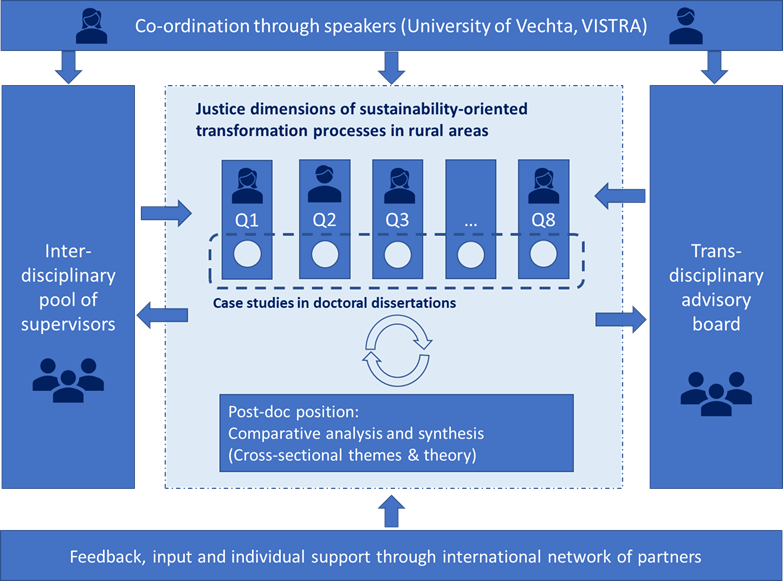Justice dimensions of sustainability-oriented transformation processes in rural areas
Doctoral college funded by the Hans Böckler Foundation

Sustainability-oriented transformations have become a central topic in scientific and societal discourses, and are overwhelmingly positively connotated. Nevertheless, they are always accompanied by social consequences (even ‘transformation-pains’) and thus raise issues of social justice that have so far been little understood, empirically researched, and reflected upon. This has consequences for the legitimacy of the implementation and governance of such processes.
The aim of the doctoral research cluster is to close this gap. In order to examine aspects and concepts of justice in different sustainability-oriented transformation processes (focusing on rural areas), the doctoral program pursues a comparative case study approach across a total of eight individual dissertations.
Exemplary topics to be addressed in the dissertation projects are:
- Transformation of the energy sector: Energy affordability and new (in)equity relations between urban and rural areas;
- Spatial justice: Equitable livelihoods, social places and local resilience;
- Issues of justice in socio-technical transition and innovation processes (e.g. in digitalisation or bio-economy);
- Supra-regional nature and climate protection policies and their local justice implications (e.g. assessing urban-rural relations, or between the global North and South);
- Gender equity in the design of transformation processes
- The role of trade unions in shaping just sustainability transformations;
- Uncertainty about the "right" ethical standard (normative uncertainty) as a practical and theoretical problem in designing just transformations;
- Risk and its perception in transformation processes
- etc.
Further topics from the context of questions of justice in sustainability-oriented transformation processes are conceivable.
Building on the comparison of the case studies analysed in the dissertations, and through the inter-disciplinary discussion and synthesis of the results, a common theoretical framework for the reflection of justice dimensions of sustainability-oriented transformation processes will be jointly constructed. For the task of synthesising, and for supporting the co-ordination of the college, a post-doc position will be filled.
The following overarching research questions are to be addressed:
- What role do questions of justice play in current sustainability-oriented transformation processes? Which socio-ecological justice concerns are affected?
- In what ways can sustainability transformations contribute to the exacerbation of injustices?
- What understanding of (in)justice underlies the descriptions of different actors in different case studies? What characterises an "(un)just" transformation from the perspective of different actors?
- Which case-specific and which overarching framework for the design of just sustainability transformations can be derived from the empirical evidence?
- What governance approaches are needed for the design of equitable transformation processes?
These questions are to be answered through an inter- and transdisciplinary approach, which is expressed in the composition of supervisors and junior researchers (among others, economics, social sciences, ethics, social and environmental psychology, geography, political sciences, etc.), and in the corresponding core themes, theoretical approaches and methods.
The college offers a structured doctoral programme and supervision concept that comprehensively supports the doctoral researchers in the development of their theoretical and methodological skills. It facilitates regular exchange and mutual learning.
National and international partners and co-operations

Beyond that, the doctoral college co-operates with national and international partner organisations that facilitate research stays and co-supervisions. This offers junior researchers excellent opportunities for exchange, learning and networking right from the start. The co-operation partners include:
- Copernicus Institute of Sustainable Development, University Utrecht
- Leibniz Centre for Agricultural Landscape Research
- Leuphana University Lüneburg
- KIT - Karlsruher Insitut for Technology
- LUCSUS - Centre for Sustainability Studies, Lund University
- Basque Centre for Climate Change
- University of Vermont
Contacts
Speakers of the doctoral college:

Prof. Dr. John-Oliver Engler
Bioeconomy and Ressource Efficiency

Prof. Dr. Jana Zscheischler
Sustainability-oriented Economics of Production
Other Professors involved in the doctoral college:

Prof. Dr. Paula Maria Bögel
Transformation Management in Rural Areas

Prof. Dr. Karl Martin Born
Geography

